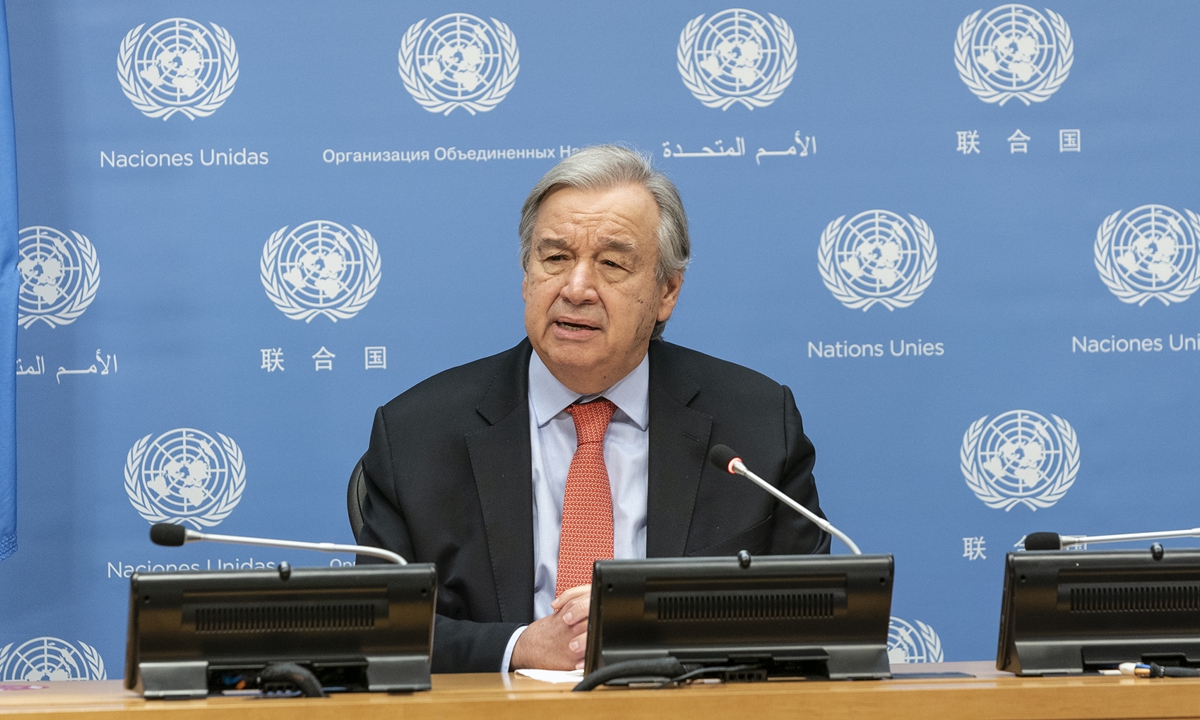UN pushes for G7 commitment to 2030 deadline by June
Wealthy nations urged to quit coal
UN Secretary-General Antonio Guterres on Tuesday called on wealthy nations to end coal use by 2030 so the world can meet its goals to curb global warming, urging G7 nations to make that commitment before or at a leaders' summit in June.

"Phasing out coal from the electricity sector is the single most important step to get in line with the 1.5-degree goal," the UN chief said.
Scientists estimate that coal use in electric power generation must fall by 80 percent below 2010 levels by 2030 to meet the 1.5 C warming limit, which is the more ambitious goal set by more than 190 nations in the 2015 Paris Agreement.
Guterres said all 37 countries in the Organisation for Economic Co-operation and Development (OECD) - a group of mainly high-income nations - should promise to stop using coal by 2030, and the rest should do so by 2040.
"Science tells us this is essential to meet the Paris Agreement goals and protect future generations," he added.
The Powering Past Coal Alliance was formed by Canada and Britain in 2017 to bring together governments and business to accelerate the phase-out of "unabated" coal power, where there is no technology in place to remove carbon emissions. It now has more than 120 members, with 10 new ones joining on Tuesday, including Hungary, Uruguay, the Japanese city of Kyoto, and utilities National Grid of Britain and Ontario Power Generation of Canada, as well as pension providers.
The alliance said in a statement that progress on phasing out coal had sped up across OECD and European Union member states, with over 55 percent of operating coal plant capacity retired since 2010 or scheduled to retire by 2030.
The British government, however - host of both the June G7 summit and 2021's UN climate talks - has come under fire for failing to block local plans for a new coal mine in northern England, which backers say is needed for steel production.
Cumbria county council has now said it will reconsider the mine application after the independent UK Climate Change Committee and green groups said going ahead with it could undermine Britain's push for net-zero emissions by mid-century.
The UK government is considering moving up a planned ban on coal power by a year, to October 2024.

Hybrid press briefing by Secretary General Antonio Guterres on the occasion of launching UNEP (UN Environment Programme) report "Making Peace With Nature" at UN Headquarters on February 18. Photo: VCG
In a video message to a virtual gathering of the "Powering Past Coal Alliance," Guterres said emissions-cutting pledges by governments fell far short of what is needed to limit climate heating to 1.5 C above preindustrial levels. But if immediate action were taken to end use of what he called the dirtiest, most polluting and increasingly costly fossil fuel in power generation, "then we have a fighting chance to succeed," he added."Phasing out coal from the electricity sector is the single most important step to get in line with the 1.5-degree goal," the UN chief said.
Scientists estimate that coal use in electric power generation must fall by 80 percent below 2010 levels by 2030 to meet the 1.5 C warming limit, which is the more ambitious goal set by more than 190 nations in the 2015 Paris Agreement.
Guterres said all 37 countries in the Organisation for Economic Co-operation and Development (OECD) - a group of mainly high-income nations - should promise to stop using coal by 2030, and the rest should do so by 2040.
"Science tells us this is essential to meet the Paris Agreement goals and protect future generations," he added.
The Powering Past Coal Alliance was formed by Canada and Britain in 2017 to bring together governments and business to accelerate the phase-out of "unabated" coal power, where there is no technology in place to remove carbon emissions. It now has more than 120 members, with 10 new ones joining on Tuesday, including Hungary, Uruguay, the Japanese city of Kyoto, and utilities National Grid of Britain and Ontario Power Generation of Canada, as well as pension providers.
The alliance said in a statement that progress on phasing out coal had sped up across OECD and European Union member states, with over 55 percent of operating coal plant capacity retired since 2010 or scheduled to retire by 2030.
The British government, however - host of both the June G7 summit and 2021's UN climate talks - has come under fire for failing to block local plans for a new coal mine in northern England, which backers say is needed for steel production.
Cumbria county council has now said it will reconsider the mine application after the independent UK Climate Change Committee and green groups said going ahead with it could undermine Britain's push for net-zero emissions by mid-century.
The UK government is considering moving up a planned ban on coal power by a year, to October 2024.




